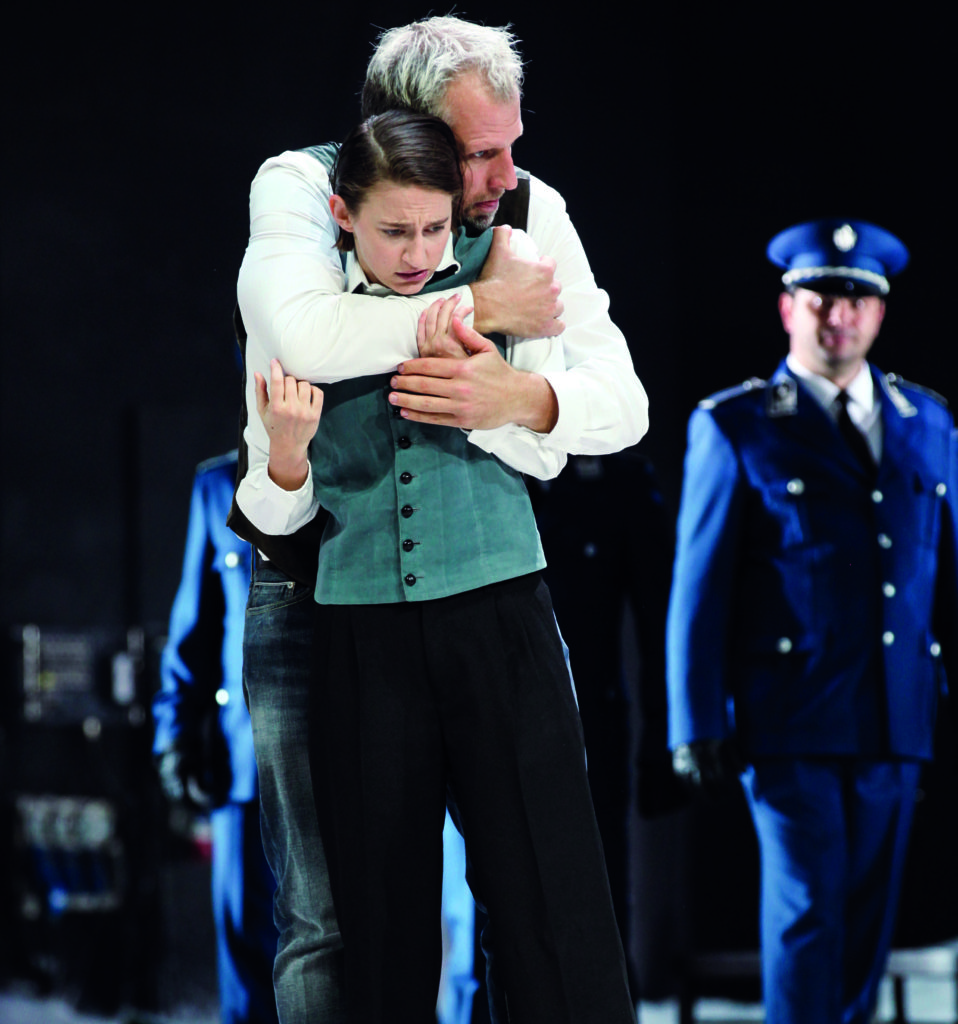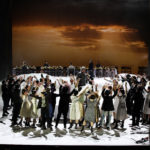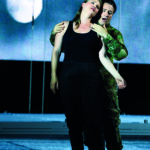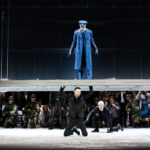 Rossini’s William Tell (Guillaume Tell), 1829, his last opera, broke new ground, a drama based on Friedrich Schiller’s Wilhelm Tell, written (1804) and inspired by the French Revolution, a study in political repression and heroism. Rossini used his genius for melody and rhythm, but in the French Grand Opera tradition. So the role of the Hapsburg princess Mathilde is built into a key character, in her identification with the freedom fighters, and through her love affair with Swiss Arnold Melcthal. And although the opera is named after the revolutionary leader, arguably, the people as chorus are in the centre of the drama.
Rossini’s William Tell (Guillaume Tell), 1829, his last opera, broke new ground, a drama based on Friedrich Schiller’s Wilhelm Tell, written (1804) and inspired by the French Revolution, a study in political repression and heroism. Rossini used his genius for melody and rhythm, but in the French Grand Opera tradition. So the role of the Hapsburg princess Mathilde is built into a key character, in her identification with the freedom fighters, and through her love affair with Swiss Arnold Melcthal. And although the opera is named after the revolutionary leader, arguably, the people as chorus are in the centre of the drama.
As Rossini’s opera and Schiller’s play are about ‘revolutionary ideals’, human rights against political tyranny, does it have to be set in the 19th century? The William Tell story is about Swiss freedom fighters; based on late 13th century history, yet legendary and timeless.
So here we are at Theater an der Wien (Vienna’s oldest opera house,) Vienna once the capital of Tell’s Hapsburg oppressors. And director Torsten Fischer sets Rossini’s opera in the here and now…
On a snow-covered stage, men in white t-shirts are fighting, one, William Tell (Christopher Pohl) kills the other with an arrow. There’s a white-on-red cross (representing the Swiss) front of stage. Stylised, dramatic, the background to the famous overture, played incisively by a pared-down, period-instrument sized Wiener Symphoniker under Diego Matheuz. The rebels emerge from under the snow as if resurrected. Tell (Christopher Pohl) embraces his son Jemmy (Anita Rosati), remarkably enacted and beautifully sung. Overhead, projected onto the rear video screen, snow planes. To the rousing William Tell March (the Overture’s Finale) snow-sweepers advance forward with their brooms and shovels. All hands on deck! Very young looking and very hardworking, the Arnold Schoenberg Choir.

For the wedding celebration, the girls in white lace are pushed on their high-roped swings by the men in top hats and tails. Tell is dressed by his wife (Marie-Claude Chappins), Pohl in a waistcoat and hat: very wild-west. While Arnold (John Osborn’s) splendid tenor appeals to the women, Tell, Pohl’s expressive baritone, sings of his fears. What a burden is life: they have no country, their life is beset with danger.
The Austrian Princess Mathilde (Jane Archibald) in an elegant blue gown- blue the colour of the Hapsburg oppressors – descends the staircase into the people below. The man in the sharp blue suit is Gesler the Austrian Commander, bass Ante Jerkunica, every inch a tyrant.
The pastor Melcthal (Jérôme Varnier) blesses the newly weds, urging them, and the community, to continue the battle for their endangered liberty. Tell passionately exhorts the people to break their chains of slavery. The enemy tyrants from the upper gallery escort Mathilde back, but -oh dear!- they’re wearing fatigues like a modern army corps.
Must he, Arnold, give her up? They appeal to his comradeship, loyalty to friends, the cause: La patrie his country. (A rehearsal of the moral dilemma Tell will have to face.) He, Arnold, must do the right thing but, Osborn sings passionately, heaven knows how much he loves her!
A shepherd rushes in, blood-covered, having killed one of Gesler’s soldiers attempting rape. The pastor Melcthal is arrested and killed as a reprisal. But the Pastor is Arnold’s brother, which heightens the dramatic conflict. He’s having an affair with the enemy.
Mathilde- Archibald’s soprano powerfully sung, sensitively enacted – sings of the dense woods where her heart finds peace. In modern black-nylon coat, she confronts rifle-carrying Arnold in fatigues, wearing a bullet-proof vest, apparently an (Austrian) guard on border patrol.  How relentless is his suffering. And hers. Their illicit affair, merciless. In their duet, Oui, vous l’arrachez á mon âme, Osborn’s lyrical tenor is supple and melodious, Archibald is beautifully sung. >But physically, she blonde, lithe,curvaceous, looms over him, he a slight, stocky, if muscular, figure. She tries to persuade him to continue fighting (with the Hapsburgs.) Do you know what it’s like to love your country, la patrie, he retorts.
How relentless is his suffering. And hers. Their illicit affair, merciless. In their duet, Oui, vous l’arrachez á mon âme, Osborn’s lyrical tenor is supple and melodious, Archibald is beautifully sung. >But physically, she blonde, lithe,curvaceous, looms over him, he a slight, stocky, if muscular, figure. She tries to persuade him to continue fighting (with the Hapsburgs.) Do you know what it’s like to love your country, la patrie, he retorts.
Tell appears with Fürst, another partisan ,Edwin Crossley-Mercer- sleek, white-haired, quietly authoritative- who’s deemed eventually to be leader. They confront Arnold about his affair with Mathilde. Using the trump card: that Gesler has had his brother killed. Arnold swears revenge. We see the body shrouded beneath a wreath of white and yellow flowers.
Pohl’s Tell is a wholly credible, heroic figure – blonde, ruggedly good-looking, his baritone exuding passionate authority. Bonheur! Freedom fighters appear from the back of the stage – their hands bloodied- and take position front-stage. They sing, only this god-forsaken, lonely place will know their pain. Avenge the death of his brother! Arnold sings appealing to their patriotism. Reflected on the screen behind them are fighter planes – a video recording- which may seem curious; but meant to universalise these partisans’ struggle. But are the planes the oppressors, or their allies?
Act III opens with a stage in shining aluminium, Arnold in black , Mathilde still in blue. Osborn sings of how his brother was killed: from now on he’ll fight for his country. Archibald attains thrilling coloratura in her aria Mon âme , pleading with him to escape with her: live for life.
 Then, back of stage, the occupying army in blue surge forward onto the stage. (But what about the aircraft on the video screen?) Storm troopers terrorise groups of civilians; a commando unit burst into a school. In a horrid exhibition of military abuse, one woman is grabbed, manhandled, and tossed between the soldiers. Gesler, resplendent in military uniform, demands, they must be suppressed. The country wants a sign of loyalty. They have to bow to his hat to prove their obedience. Tell of course refuses. And charged, must shoot an arrow on his son’s head.
Then, back of stage, the occupying army in blue surge forward onto the stage. (But what about the aircraft on the video screen?) Storm troopers terrorise groups of civilians; a commando unit burst into a school. In a horrid exhibition of military abuse, one woman is grabbed, manhandled, and tossed between the soldiers. Gesler, resplendent in military uniform, demands, they must be suppressed. The country wants a sign of loyalty. They have to bow to his hat to prove their obedience. Tell of course refuses. And charged, must shoot an arrow on his son’s head.
Terrible fate; my son, my only hope! Gesler has no mercy. Jemmy, however, will die in his father’s arms. My place is by him, he sings.
Gesler, in his armchair, louche, fingers an apple – big, red – and sniffs it. People sit, men and women divided into two groups. Tell is known as an expert shot, Gesler sings, his face alight with sadistic glee.
There is a God, Tell sings, reflecting on his duty. He pleads to Gesler on his knees. But his son takes the apple, and promises to stand absolutely still. Tell, fears allayed, is inspired by his son’s steadfastness . He will die free, Jemmy sings, (his father’s hand still trembling). Mon fils, accompanied by a plaintive cello, (wonderfully played), Pray to God, only he can save him. Jemmy, think of your mother. The shot- at the back of the stage, over so quickly- the boy unharmed. But Tell had a second arrow -meant for Gesler. He and Jemmy are arrested. But Mathilde intercedes; she will protect him.
The crowd held back by a line of soldiers. Storm troopers threaten, their guns loaded. Gesler will throw him to the reptiles in Lake Lucerne .
The Swiss in uproar revolt, Tell now a popular hero. In Fischer’s expurgated version, Tell confronts Gesler, drives him out, swearing to kill anyone who supports him.
Tell and Gesler wrestle on the revolving stage; in a replay of the opening, Tell kills him with an arrow. Their land is free. Yet, symbolically, Fürst, Crossley-Mercer, puts on Gesler’s military jacket: as if the mastermind, the ruler apparent. The back of the stage has slogans, exhorting Peace and Goodwill. The Chorus of Swiss fighters sing Liberté redescends again from the heavens.
The whole experience has been overwhelming. Performances of Guillaume Tell are relatively rare, the staging challenging. Yet Theater an der Wien succeeded with tight resources. That’s if you’re not phased by this modern take with its cuts; not obtrusive, intelligently thought out. The cast were rightly enthusiastically applauded. © P.R.21.10.2018
Photos: Christoph Pohl (Guillaume Tell), Anita Rosati (Jemmy); Marie-Claude Chappuis (Hedwige), Christoph Pohl, Edwin Crossley-Mercer(Furst); Jérôme Varnier (Melcthal), John Osborn (Arnold); Jane Archibald (Mathilde), John Osborn (Arnold); Gesler (Ante Jerkunika)
Photos © Moritz Schell
